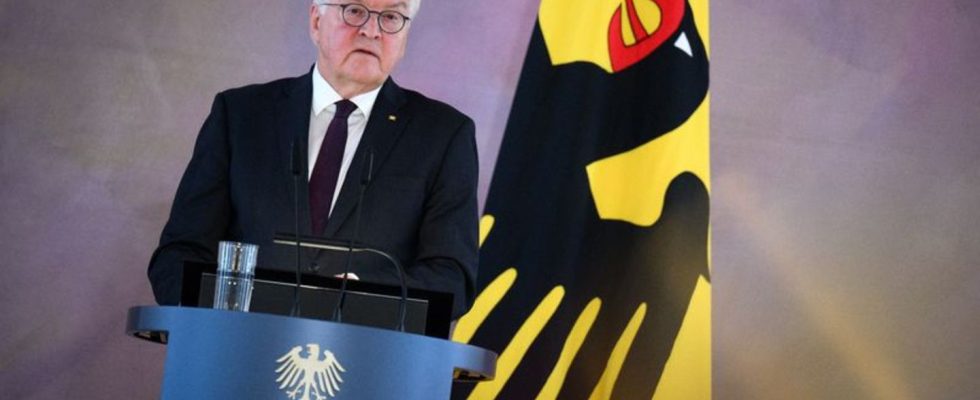National Socialism
Historian: Federal presidents shaped how they dealt with the Nazi era
Federal President Frank-Walter Steinmeier. photo
© Bernd von Jutrczenka/dpa
Many institutions have already had their National Socialist past examined. The results of a research project for the Federal Presidents are now available.
This has developed into a feature of the German way of dealing with the Nazi past. At the beginning there was Theodor Heuss’ “formative influence on the politics of the past”. The first head of state coined or rejected relevant terms like no other politician, especially in the early years of his presidency.
Three months after his election in 1949, Heuss spoke of “collective shame” – which was aimed at countering the term “collective guilt” with which the Germans wanted to fend off Allied denazification efforts. But Heuss found a collective shame necessary. The admission in 1952 (“We knew about things”) that the Germans were aware of the persecution of the Jews – contrary to what is often claimed – was also of standard-setting importance.
Six federal presidents analyzed
Federal President Frank-Walter Steinmeier, who initiated the research project, emphasized that it is a special obligation for a federal president to face the history of his office. “Especially at this time when our democracy is so under attack, we as a society must be aware of our history,” warned Steinmeier. “Because what should not be repeated must not be forgotten. We have to know that.”
Frei and his team analyzed the six federal presidents of the Bonn Republic – Theodor Heuss, Heinrich Lübke, Gustav Heinemann, Walter Scheel, Karl Carstens and Richard von Weizsäcker.
Lübke and Heinemann contributed their part to the functioning of the Nazi war economy at the expense of the millions of forced laborers, said Frei – Lübke as a senior employee of a private engineering firm active in the armaments sector, Heinemann as legal counsel for the Rheinische Stahlwerke in Essen. After a campaign launched by East Berlin that made Lübke the “concentration camp builder”, he resigned ten weeks before the end of his second term in 1969.
Damaged your own credibility
“With Walter Scheel and after him Karl Carstens, members of the soldier’s generation took over the highest office in the state in the course of the 1970s, who tried to downplay their membership in the NSDAP, which was by no means of their own free will.” According to the historian, both had damaged their credibility. “To position oneself critically about the Nazi past and to advocate for coming to terms with it is now one of the basic expectations that a growing part of German society places on their head of state.” Even before his election, Carstens felt this as a wave of indignation, especially among young people.
And Weizsäcker? On May 8, 1985, with his speech on the 40th anniversary of the end of the war, the former Wehrmacht officer received applause – including internationally – like no other president before or since, said Frei.
However, the historian pointed out that a considerable part of the public impact of this speech can be explained by the scandal triggered shortly before by Chancellor Helmut Kohl (CDU) when he urged US President Ronald Reagan to visit the Bitburg military cemetery There were also casualties of the Waffen-SS. “And one may ask oneself what effect the Weizsäcker speech would have had if the president had supported the pardon of Hitler’s former deputy Rudolf Heß – which he only refrained from doing at the last minute on the urgent advice of his colleagues.”

